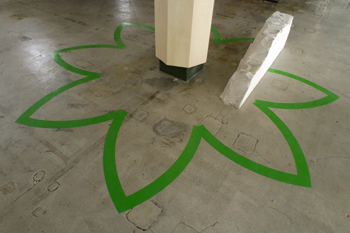WWW.HAUSSITE.NET
AMP (Asiatic Mode of Production)
07 / 04 / - 16 / 07 / 00
Exhibition / Events
AMP (Asiatic Mode of Production)
forms of contemporary popular asian culture
from a second generation perspective
produced by haus.0 / Ruby Sircar (D)

"Lotus" column, main element in "amp" exhibition design
system
see also:
AMP project page
AMP
is a project developed through the media narratives created by commissions
to Asian participants from various cultural fields.
The project
works with issues related to the term "Asiatic Mode of Production", which
originally described a shift from feudalism and mercantilism to capitalism,
and offered a description of society defined by the outlines of a geographic
space.
In the last decade theorist Gayatri Spivak chose to redefine the term AMP
for the field of Cultural Studies by referencing it to the developments
after colonialism and in terms of globalisation, from independent nation,
to vast economic emigration, to cultural 're-colonisation'. Asian cultural
production today can not be defined by virtue of geographical boundaries,
thus leaving ethnic identity as one parameter. Spivak introduced a changing
psychological level to her new definition of AMP, and linked this to the
'Native Informant' (NI), a figure related to a notion of culture bound directly
to an actual geographical site and nation. Spivak argues that today the
N.I. is now alienated. A contemporary expression of that condition is 'living
abroad' - the term used by second-generation Asians to describe their current
state of being. For this generation, two main responses appeared to develop
- one links back to the security of a mythologized native culture, in order
to 'recolonize' it by reflecting an ideal picture of their inherited culture
onto the actual existing nation.The other response reflects conditions linked
to living abroad, as the material to create a variety of understandings
pertaining to the role of culture and identity and new kinds of community
formations.
While
Spivak's ideas are based on colonial, racist and sexist issues pertaining
to the original generation of the Native Informant, Sircar's curatorial narrative
goes on to inscribe the second generation NI. This generation creates a new
semantics of identity to correspond with a complex reality made through the
various projections onto them. One important structuring relationship belonging
to 'recolonisation' finds that the previous generation perceive their children
in terms of a static picture that mirrors an idealised ‘native’ society, as
meanwhile that picture’s actual indexed society is comprised of dynamic cultures
that have been transforming family values and societal constructions.
AMP
creates mappings of the semantics at work from the second generation NI. In
particular, Sircar has selected from popular and contemporary Asian culture
relevant to her own point of view, specific to gender and generational themes,
in order to assemble perspectives on the changing representation of the category
'woman'. Sircar emphasises the role of women within Asian society as that
continues in transition from the private sphere as a cultural heritage to
the public education and its particular links to public media. AMP intertwines
both the desire to shape a new expression for the feminist struggle to script
spaces by creating women's voice anew, and the unique search-patterns set
up by the character of the second generation as NI.
Through this interplay AMP suggests the recognition of other notions of cultural
identity and community by orienting new links to a mix of past and futures.
Already early in its development, bringing together the project AMP raised
ideas to initiate a different type of forum for the local second generation,
which Sircar makes further manifest in the project. The combination of dialogs
shapes the project further, and a reminder of the integral role cultural institutions
can play in production for a corresponding interface to the many new semantics
underway.